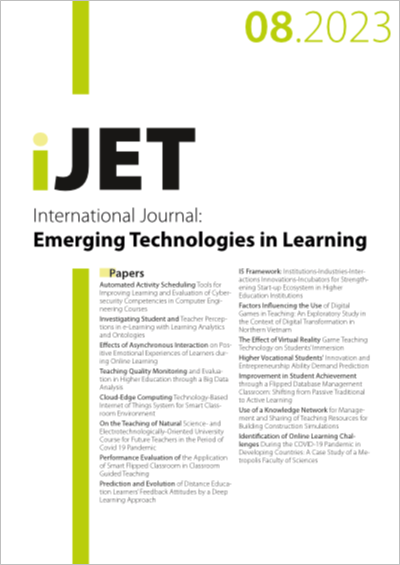Performance Evaluation of the Application of Smart Flipped Classroom in Classroom Guided Teaching
DOI:
https://doi.org/10.3991/ijet.v18i08.37823Keywords:
Smart flipped classroom, guided teaching, application and performance evaluation, subjective initiative, teaching modeAbstract
The emergence of the smart flipped classroom has since changed the traditional teaching mode in China: students are stimulated to independently learn in advance, and teachers provide classroom guidance according to the problems encountered by students, help students deal with difficult knowledge, and guide them with homework to improve multidimensional learning performance. These advantages lead to various proposals for its application and performance evaluation in classroom-guided teaching. By collecting teaching-related data from students in both the smart flipped and the traditional teaching classroom, the performance of the smart flipped classroom in the classroom-guided teaching was evaluated from three aspects: online learning performance, examination results, and after-school homework results. Results indicate there is a significant difference between students’ learning performance before and after application of the mode. The smart flipped classroom teaching mode improves students’ academic performance along with the significant difference between students’ academic performance and traditional teaching mode. The mode effectively mobilizes students’ learning initiative and improves their learning satisfaction. Conclusions herein play a certain guiding role in changing mainstream teaching modes and improving students’ learning concepts.
Downloads
Published
How to Cite
Issue
Section
License
Copyright (c) 2023 Lijin Wang, Amymya Menghua Liu

This work is licensed under a Creative Commons Attribution 4.0 International License.


